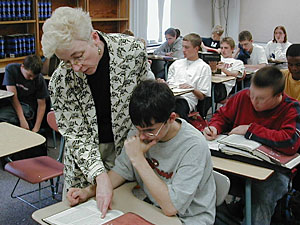Audio
Photos
Your Voice
| |||||||||||||||||||||||||||||||||||||||||||||||
Profile concepts could live on in schools after repeal
May 14, 2003
 |
| Richfield High School teacher Ann Stinde and her 10th grade English students discuss a play. (MPR Photo/Tim Pugmire) |
St. Paul, Minn. — The Profile de-emphasizes textbook memorization. Instead, it identifies 48 "content standards" at the high school level spread across 10 subject areas. Those areas include language, math, science, resource management and decision-making. The focus is on students demonstrating what they've learned through projects and performances. The broad skills they learn can then be applied to a variety of learning situations. Teachers, parents and students found the system difficult to navigate.
Tenth grade students at Richfield High School hand out textbooks as they prepare to read portions of Tennessee Williams' play The Glass Menagerie. English teacher Ann Stinde has been in the district 17 years. She's worked with the Profile since the early 1990s, when Richfield was selected as a pilot site for the new state standards.
"I think right from the first, there was a real serious intent to make this work," Stinde said. "I think it was difficult to make it work because the state changed its mind several times. We would get organized. We would be ready to go, and they decide that they didn't need so many standards, or they needed to be implemented some other way."
Students in the class recently completed a public speaking standard. Stinde says public speaking is an important, real-world skill. But it's also something she's always required of her students. She says the Profile did not improve her teaching.
"I thought personally, if they could tell us specifically what they wanted these students to be able to do, and when they wanted them to be able to do it, we could surely have gotten them there without being told how," Stinde said.
|
I think one of the values of the standards that we've had is that it went beyond just pure knowledge.
- Barbara Devlin |
In another classroom at the school, Nicole Schiffler works with a student in her English as a Second Language class. Schiffler has taught at Richfield High School for four and a half years. She says she likes the theory behind the Profile, and thinks it's worked well for ESL students.
"Students learn different," Schiffler said. "We all do. And to have just one scripted way to learn it doesn't always work. So, I think having an authentic assessment, or having more performance, does help them a little bit more, where they might have learned it but they can't tell you in the standardized way. They could tell you in a different way."
But Schiffler also see flaws in the current system and wants some changes. Teachers have complained about the difficult-to-understand scoring system, vaguely written standards, time-consuming classroom activities and too much additional paperwork.
Former state education commissioner Bob Wedl agrees that changes are needed, but he says some core concepts should remain. Wedl served in the Carlson administration during the Profile implementation. He says many teachers have embraced project-based learning and the concept of letting students meet standards in a variety of ways.
"The narrow version says you can only meet a standard and get credit for something that's in specific courses," Wedl said. "So, if you're gong to get credit for writing, that could only happen in a composition course. The Profile clearly made its point that standards should be able to be met in a number of different learning environments, including learning environments in the community."
Wedl says the ongoing political debate kept some school districts from fully implementing the Profile. Many districts also eased their graduation requirements. The graduation rule originally required students to complete 24 of the 48 standards to earn a diploma. The Legislature later allowed districts to decide.
In Richfield, the class of 2002 and 2003 had to complete 21 standards. Superintendent Barbara Devlin says those standards are embedded into the curriculum.
"We didn't want it to stand out as being an add-on," Devlin said. "And in many cases, I think students were working on graduation standards without even knowing they were working on standards." The Minnesota House and Senate have passed bills repealing the current standards, but they're deeply divided over what should replace them. The Republican House favors a new set of back to basics standards. The DFL-controlled Senate's replacement is largely based on the existing system, but it revises and condenses the content standards.
Superintendent Devlin says she hopes the bills can be blended into a workable compromise. She says standards based solely on knowledge will shortchange students.
"I think one of the values of the standards that we've had is that it went beyond just pure knowledge, to saying, 'How can our students use that knowledge? Can they apply that knowledge for some purpose?" Devlin said.
Devlin says the Richfield school district will wait until the Legislature acts before deciding whether to preserve portions of the existing Profile system.
|
News Headlines
|
Related Subjects
|

